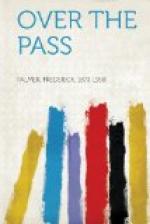“Brother! Brother! Yes!” repeated Jack, with dry lips.
This shaping of conviction into fact so nakedly, so coolly, made all the desert and the sky swim before him in kaleidoscopic patches of blue and gray, shot with zigzag flashes. He half reeled in the saddle; his hands gripped the pommel to hold himself in place. It was as if a long strain of nervous tension had come to an end with a crack. Prather’s smile took a turn of deeper satisfaction. It was like John Wingfield, Sr.’s after Jack had left the library.
“This is the first time we have ever met to speak,” said Prather, easily.
“Yes!” assented Jack, the gray settling back into desert and the blue into sky and the zigzag flashes becoming only the brilliance of late afternoon sunshine.
“Certainly it is time that we got acquainted, brother,” said Prather.
“It is!” agreed Jack. “It is time that I knew your story!”
“Which you have hardly heard from your—I mean, our father!” The pause between the “your” and the “our” was made with an appreciative significance. “Well, you see, I was the brother who had the mole on his cheek!”
“Yes—pitifully yes!” said Jack, with a kind of horror at the expression of this face in his father’s likeness, no less than at the words.
“Why, no! I’ve often thought of you rather pitifully!” said Prather.
“You well might!” Jack answered, feelingly. “We may well share a common pity for each other.”
There was no sign that John Prather subscribed to the sentiment except in a certain quizzical turn of his lips, as he looked away.
“Yes, the story has been kept from me. I have come for it!” said Jack.
“That is raking out the skeletons. But why not rake out our skeletons together, you and I?” said Prather.
It was clear that he enjoyed the prospect as an opportunity for retributive enlightenment.
“To begin with, I have the rights of primogeniture in my favor,” he said. “I was born a day before you were, in the same city of New York. My mother’s name was not down in the telephone list as Mrs. Wingfield, however—I look at it all philosophically, you understand—and it was just that which made the difference between you and me, outside of the difference of our natures. But I am proud of my birth on both sides, in my own way. My mother was won without marriage and she was true to father. A woman of real ability, my mother! She was well suited to be John Wingfield’s wife; better, I think, in the practical world of materialism than your mother. By a peculiar coincidence, unknown to father, my mother called in Dr. Bennington. So you and I have a further bond, in that the same doctor brought us into the world.”
“And my mother must have known this!” Jack exclaimed, in racking horror.




